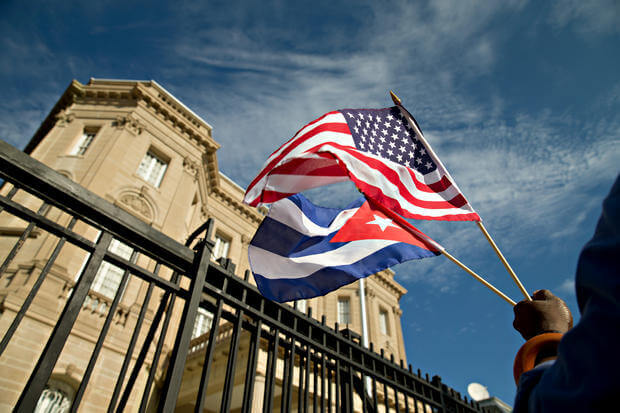On Thursday in Washington, high-ranking government officials from the United States (US) and Cuba held talks for the first time in four years to address the monumental surge in the migration of Cubans to the US, which Havana says is a direct result of the Washington’s coercive economic measures.
After the meeting, the US State Department said in a statement that the talks provided a platform for Washington and Havana to discuss the Migration Accords, a series of bilateral agreements that were first drafted in 1984. They also emphasised looking forward to maintaining diplomatic ties with Cuba “where appropriate to advance [the] US interests.” In this regard, Washington highlighted that the issue of migration, particularly, is of “mutual interest.”
It's historically proven that every time the #US closes legal pathways to emigrate, breaches immigration agreements, intensifies the blockade vs #Cuba🇨🇺 & maintains policies & laws that privilege Cubans, it creates conditions that foster irregular, disorderly & unsafe emigration. https://t.co/PPXgO3kpYO
— Josefina Vidal (@JosefinaVidalF) April 22, 2022
In a press conference, State Department spokesman Ned Price explained the rationale behind holding the talks by saying, “We’ve seen a significant increase in irregular migration on part of Cuban migrants coming to the United States.”
Statistics from the US Customs and Border Protection agency show that 79,800 Cubans have been stopped from entering the US via the southern border with Mexico over the last six months alone, five times more than in all of 2020. Sea crossings have also increased this year, with the US Coast Guard having intercepted 1,257 Cubans compared to 838 the previous year.
Prior to the talks, Cuba’s Vice Minister of Foreign Affairs, Josefina Vidal, criticised the US migration policy as “incoherent” and “differentiated,” noting that while Washington continues to finance economic recovery in many countries in the region, it continues to apply “maximum pressure to the economic order [of Havana] and through coercive measures,” referring to an embargo that has been in place since 1960.
After the meeting, Cuba’s Ministry of Foreign Affairs stressed its support for implementing the Migration Accords. However, it said that the root cause for emigration from Cuba is Washington’s sanctions, which “create social and economic conditions that incentivise emigration.” In this regard, Cuba insisted that the US issue at least 20,000 visas every year for Cubans willing to migrate, noting that this was previously agreed to in the 2017 iteration of the Migration Accords. Moreover, the Cuban delegation also made it clear that Washington should “stop hindering and violating the rights of Cubans to travel to third countries of the region.”
During a round of migration talks in Washington D.C, between #Cuba and the United States both delegations reviewed the compliance with the bilateral Migration Accords and the mutual commitment to guarantee a regular, safe and orderly migration.
— Cuban Embassy in US (@EmbaCubaUS) April 22, 2022
Against this backdrop, officials in Texas are bracing for a “logistical nightmare” come May 23, when the Biden administration will remove all coronavirus-induced border restrictions. In March alone, US border authorities reportedly arrested 210,000 migrants attempting to enter the country through the southern border with Mexico, marking the highest monthly total in two decades and a 24% increase from the same month last year. Around 170,000 migrants are currently waiting in camps in Mexico. Officials in bordering states in the US have said that current federal funding is insufficient to deal with such a huge influx.
The Biden administration has urged Latin American countries to help control border migration into the US. Earlier this week, Secretary of State Antony Blinken discussed the migration issue with top officials in Panama. Additionally, the US has held talks with governments of the Dominican Republic, Nicaragua, and Mexico to reduce the growing migration of their populations into the country.
The US first placed an embargo on Cuba in 1960 in response to its nationalisation of US-owned oil refineries. This measure was then extended in 1962 and came to resemble one of the key features of the Cold War era. Under Donald Trump, the US once again doubled down on its punitive measures against Cuba. In January 2021, the Trump administration once re-added Cuba to the US’ State Sponsors of Terrorism list and imposed a host of new sanctions, a policy that the Biden administration has said it does not plan to change.
Today U.S. and Cuban officials met to discuss safe, legal, and orderly migration, as well as family reunification, consistent with U.S. interests in fostering greater respect for human rights and fundamental freedoms for the Cuban people. https://t.co/ttZasGtygD
— Brian A. Nichols (@WHAAsstSecty) April 21, 2022
Cuba argues that the blockade amounts to economic coercion and constitutes a human rights violation. In fact, it cost it around $9 billion in 2020 alone. Furthermore, its economy contracted by 11% last year, the biggest decline in almost three decades.
As per a report by Amnesty International, sanctions against Cuba have contributed to “malnutrition [...], poor water quality, lack of access to medicines and medicinal supplies, and limited the exchange of medical and scientific information due to travel restrictions and currency regulations.”
The measures have found little support among the international community, even from the US’ traditional allies. In June of last year, members of the United Nations General Assembly (UNGA) voted to condemn the blockade for the 29th consecutive year, with 184 votes in favour, 2 votes against, and 3 abstentions.

